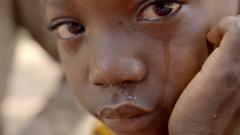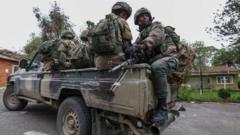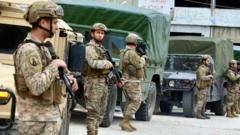A year after a devastating drone strike during a religious celebration in Tudunbiri, Kaduna State, the local community continues to grapple with immense loss and the search for justice.
"Grief and Resilience: Remembering Lives Lost in Kaduna Drone Strike"

"Grief and Resilience: Remembering Lives Lost in Kaduna Drone Strike"
Villagers reflect on the aftermath of a tragic drone strike during a religious festival, mourning lost loved ones while seeking accountability.
The soothing yet haunting atmosphere of Tudunbiri remains shadowed by tragedy as villagers mourn the children and loved ones lost to a drone strike carried out by Nigeria's military. The attack, which occurred during an Islamic festival on December 3, 2023, mistakenly targeted a gathering of civilians, resulting in the deaths of approximately 85 people, including Masud Abdulrasheed's seven-year-old daughter, Habeebah, and numerous students from the local Islamic school he taught at.
Reflecting on the catastrophic night, Abdulrasheed recalled the chaos ensued. "The first bomb dropped on us at around 10 pm, close to a tree where women and children were seated," he said, reliving the horror. The community had gathered to celebrate Maulud, marking the birth of Prophet Muhammad.
While Abdulrasheed's four-year-old daughter, Zaharau, survived but sustained shrapnel injuries, the community echoed his loss, as many families were shattered that night. Aisha Buhari, a local resident, lost three younger brothers in the strike and now bears the scars, both physical and emotional, that limit her day-to-day life.
The military has since expressed regret over the incident, attributing it to "a failure of intelligence." Major General Edward Buba, a military spokesperson, asserted, "If we could bring the lives lost back, we would." As a measure of accountability, two military personnel are reported to be facing court-martial proceedings over the tragic event.
In response to the outcry, Kaduna State Governor Uba Sani pledged to ensure proper treatment for the injured and promised to visit Tudunbiri to assess ongoing needs. He affirmed that no discharge should occur until full recovery is guaranteed. Beyond immediate healthcare, the governor also announced developmental projects in the village to discourage the sense of abandonment felt by the victims’ families, yet questioned the fairness of land confiscation during the hospital’s construction.
Despite the heartbreak, the local community held their Maulud festival this year, marking it slightly earlier to commemorate those they lost alongside inaugurating a new mosque—built post-tragedy—as a small semblance of hope and resilience. Abdulrasheed took on the role of imam, recognizing the complexity of mourning while continuing to celebrate faith.
As locals grapple with disjointed compensations that have often felt inadequate, the larger question remains: what measures will be taken to prevent such tragedies in the future, and how will the government ensure justice for the innocent lives lost?
As days turn into months, the memory of that harrowing night lingers. The promise of change needs to translate into action, as victims and survivors navigate their new reality with the hope for healing and acknowledgment of their pain. Amidst sorrow, communities like Tudunbiri persist in their resilience, clinging to the memory of their loved ones while challenging those in power to honor their sacrifices with justice and accountability.
Reflecting on the catastrophic night, Abdulrasheed recalled the chaos ensued. "The first bomb dropped on us at around 10 pm, close to a tree where women and children were seated," he said, reliving the horror. The community had gathered to celebrate Maulud, marking the birth of Prophet Muhammad.
While Abdulrasheed's four-year-old daughter, Zaharau, survived but sustained shrapnel injuries, the community echoed his loss, as many families were shattered that night. Aisha Buhari, a local resident, lost three younger brothers in the strike and now bears the scars, both physical and emotional, that limit her day-to-day life.
The military has since expressed regret over the incident, attributing it to "a failure of intelligence." Major General Edward Buba, a military spokesperson, asserted, "If we could bring the lives lost back, we would." As a measure of accountability, two military personnel are reported to be facing court-martial proceedings over the tragic event.
In response to the outcry, Kaduna State Governor Uba Sani pledged to ensure proper treatment for the injured and promised to visit Tudunbiri to assess ongoing needs. He affirmed that no discharge should occur until full recovery is guaranteed. Beyond immediate healthcare, the governor also announced developmental projects in the village to discourage the sense of abandonment felt by the victims’ families, yet questioned the fairness of land confiscation during the hospital’s construction.
Despite the heartbreak, the local community held their Maulud festival this year, marking it slightly earlier to commemorate those they lost alongside inaugurating a new mosque—built post-tragedy—as a small semblance of hope and resilience. Abdulrasheed took on the role of imam, recognizing the complexity of mourning while continuing to celebrate faith.
As locals grapple with disjointed compensations that have often felt inadequate, the larger question remains: what measures will be taken to prevent such tragedies in the future, and how will the government ensure justice for the innocent lives lost?
As days turn into months, the memory of that harrowing night lingers. The promise of change needs to translate into action, as victims and survivors navigate their new reality with the hope for healing and acknowledgment of their pain. Amidst sorrow, communities like Tudunbiri persist in their resilience, clinging to the memory of their loved ones while challenging those in power to honor their sacrifices with justice and accountability.




















